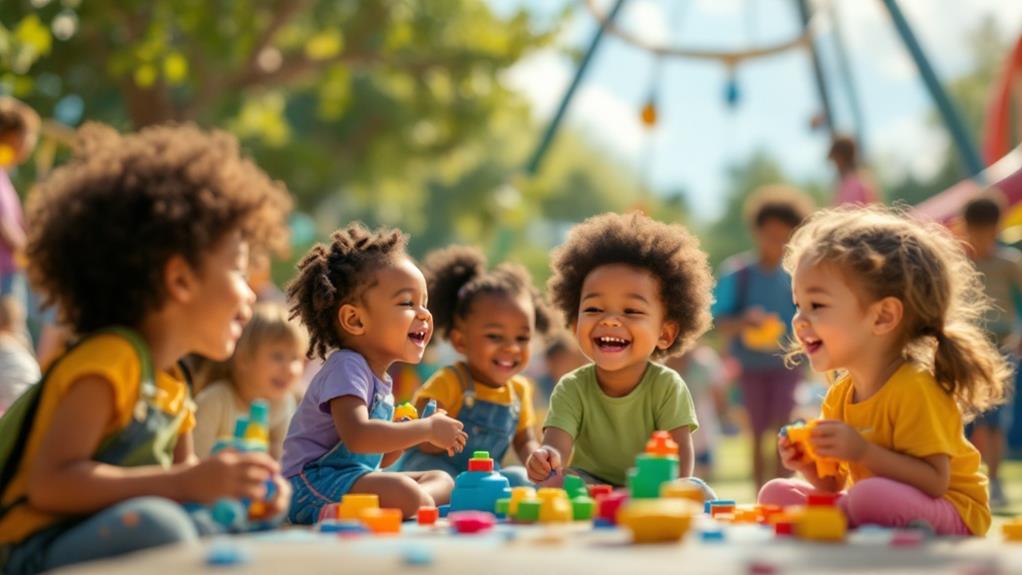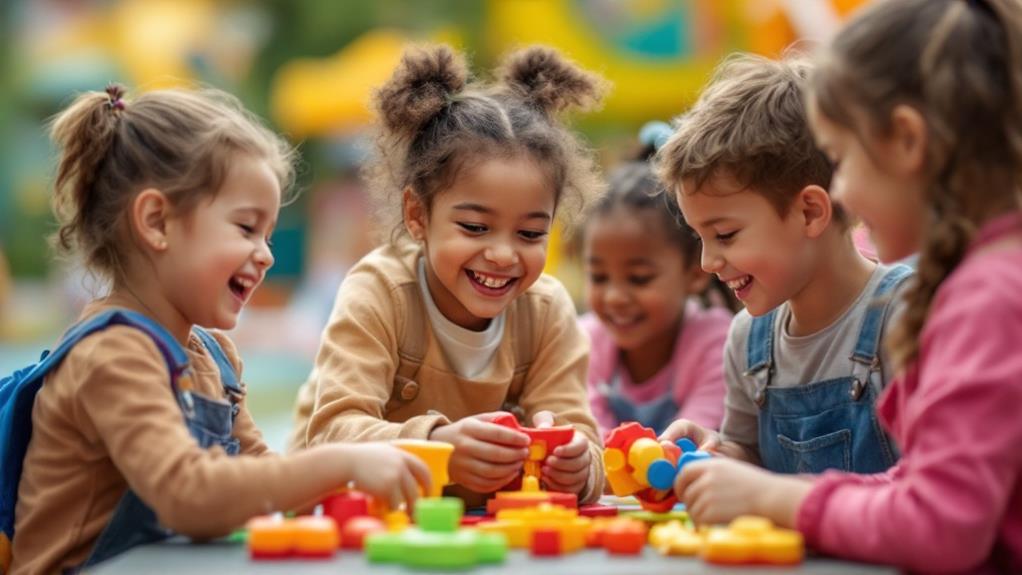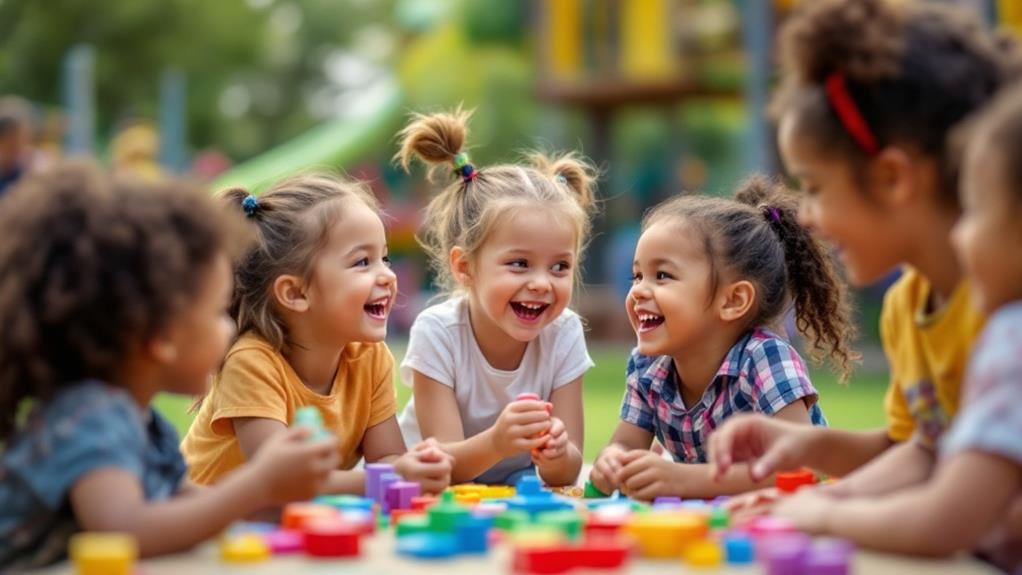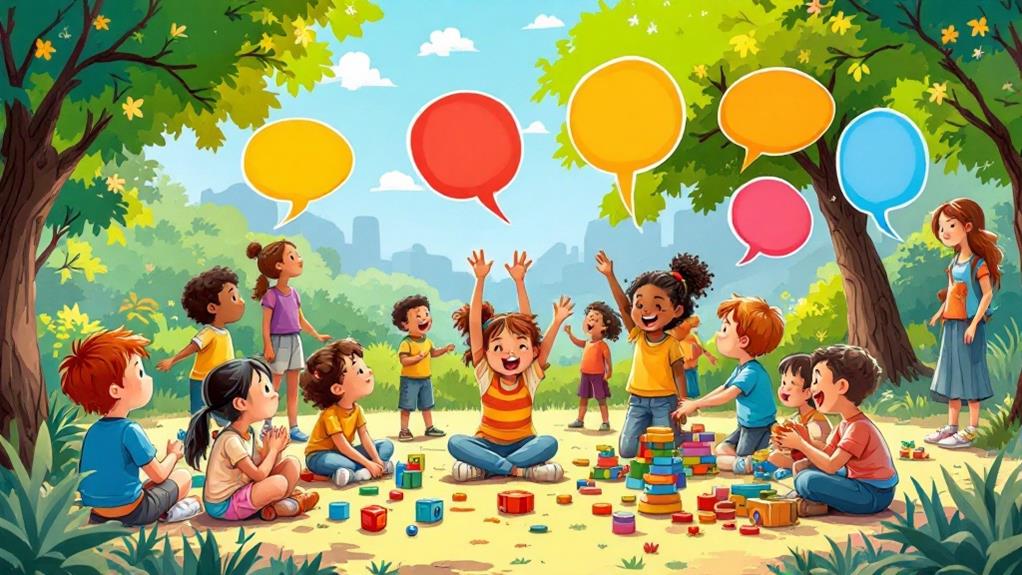Improving your child's speech abilities can truly transform their social interactions. When children express themselves clearly, they build confidence and create deeper connections with their peers. Strong communication skills foster understanding, encourage active listening, and enhance empathy, making it easier for kids to navigate friendships. As your child articulates thoughts and feelings, they experience less frustration and more meaningful relationships. Engaging in conversations and play helps them practice these skills. Every effort you make to support their speech development can lead to richer social experiences. The journey of fostering these skills reveals even more rewarding insights about their growth.
Key Takeaways
- Clear speech enhances children's ability to express thoughts and feelings, facilitating smoother interactions with peers.
- Improved communication skills foster understanding and empathy, leading to deeper friendships and meaningful connections.
- Confident speakers are more likely to engage in group activities, promoting collaboration and strengthening social bonds.
- Active listening skills encourage reciprocity in conversations, allowing children to feel valued and heard in social settings.
- Speech therapy provides essential tools for articulation and social skills, empowering shy children to become more outgoing and participative.
Importance of Speech Development

When you think about your child's future, it's easy to see how crucial speech development is for their overall growth. Effective communication isn't just about words; it's a bridge that connects your child to the world around them. When children express themselves clearly, they gain confidence and feel more secure in their interactions. You want your child to share their thoughts, dreams, and feelings, and it all starts with the ability to articulate.
As your child develops their speech skills, they also begin to understand the nuances of conversation. They learn to listen, respond, and engage with others, creating a solid foundation for meaningful relationships. This journey isn't just about vocabulary; it's about fostering empathy, understanding, and a sense of belonging.
You have the opportunity to nurture this crucial skill by providing a rich linguistic environment. Engage in conversations, read together, and encourage play that stimulates language use.
Every word they learn is a step toward building connections and expressing their unique identity. In supporting your child's speech development, you're not just helping them communicate—you're empowering them to thrive in a world filled with endless possibilities.
Role of Communication in Social Skills
Communication plays a pivotal role in shaping your child's social skills, helping them to connect with peers and maneuver through the complexities of relationships. When your child learns to express themselves clearly, they can share their thoughts, feelings, and ideas more effectively. This clarity fosters understanding, allowing friendships to blossom.
As your child develops their communication skills, they also learn to listen actively. This skill is essential for building rapport and empathy. By understanding others, they can respond appropriately, enhancing their social interactions. Think about how a simple conversation can lead to shared experiences and deeper connections; these moments are the foundation of lasting friendships.
Moreover, effective communication encourages your child to engage in group activities, whether it's team sports, collaborative projects, or casual playdates. Each interaction offers a chance to practice and refine their skills, boosting their confidence in social settings.
As they become more adept at maneuvering through conversations, they'll feel more comfortable in various social situations.
Ultimately, fostering strong communication skills will empower your child to build meaningful relationships and enjoy a rich social life, paving the way for a fulfilling journey through childhood and beyond.
Impact of Speech on Confidence

Many children experience a boost in confidence as their speech skills develop. When they can express themselves clearly, they feel more empowered in social situations.
You might notice your child becoming more willing to engage with peers, leading to richer interactions. Improved speech abilities can transform how children perceive themselves and their place in the world.
Here are some ways enhanced speech skills can foster confidence:
- Effective Expression: Children articulate their thoughts, reducing frustration and encouraging collaboration.
- Positive Reinforcement: Peers respond positively to clear communication, boosting self-esteem.
- Social Engagement: Confident speakers participate more actively in group settings, fostering friendships.
- Resilience: As they face challenges in speaking, overcoming these hurdles builds grit and determination.
Enhancing Listening Abilities
Listening is just as essential as speaking in fostering social skills and meaningful interactions. When you enhance your listening abilities, you're not just absorbing words; you're engaging with others on a deeper level. You create an environment where children feel valued and understood, building their confidence to share their thoughts and feelings.
By actively listening, you model patience and respect, teaching children the importance of giving others their full attention. This practice cultivates trust and encourages open communication among peers. When children feel heard, they're more likely to reciprocate, leading to richer friendships and social connections.
Think about how it feels to be truly listened to—it's empowering and validating. You can inspire children to replicate that experience for their friends. Encourage them to make eye contact, nod in understanding, or ask follow-up questions. These small actions can greatly strengthen their interpersonal relationships.
In nurturing these listening skills, you're not just helping children communicate better; you're fostering an inclusive community where everyone feels safe and appreciated. As you support their growth, you'll witness the blossoming of authentic connections and a profound sense of belonging.
Building Empathy Through Dialogue

Through engaging conversations, you can help children cultivate empathy, an essential component of social skills. When kids learn to express themselves and listen actively, they begin to understand different perspectives. This understanding fosters connections with peers and enhances their ability to navigate social situations.
To build empathy through dialogue, consider these approaches:
- Ask open-ended questions: Encourage children to share feelings and thoughts, prompting deeper conversations.
- Model empathetic responses: Demonstrate how to validate others' emotions, showing that it's okay to feel differently.
- Share stories: Use literature or personal experiences to illustrate diverse viewpoints, helping children relate to others' experiences.
- Encourage role-playing: Create scenarios where children can practice responding to various emotions, strengthening their empathetic skills.
Speech Therapy and Social Outcomes
Recognizing the impact of speech therapy on social outcomes can be transformative for children facing communication challenges. When you support a child in improving their speech abilities, you're not just helping them articulate words more clearly; you're fostering connections that can enrich their lives.
As their confidence grows, you'll see them engage more with peers, share their thoughts, and express their feelings without fear of being misunderstood.
Every session of speech therapy offers a chance to enhance social skills. Children learn to take turns in conversations, understand non-verbal cues, and respond appropriately in various social situations.
These skills are essential for building friendships and maneuvering through social landscapes effectively. You might witness a shy child blossom into a more outgoing individual, enthusiastic to make friends and participate in group activities.
Peer Interaction and Language Skills

Many children thrive when they engage in meaningful peer interactions, especially as they develop their language skills. When kids learn to express themselves clearly, they create opportunities for deeper connections with their peers. These interactions can be transformative, helping children build confidence and friendships that last a lifetime.
Here's how improving language skills enhances peer relationships:
- Effective Communication: Clear speech allows children to express their thoughts, fostering understanding and collaboration.
- Emotional Connections: Sharing ideas and feelings verbally helps children relate to one another on a deeper emotional level.
- Conflict Resolution: Strong language skills enable kids to discuss disagreements calmly and find solutions, promoting harmony in friendships.
- Social Learning: Engaging with peers teaches children about different perspectives, enhancing their empathy and social awareness.
As you support children in their speech development, remember that every word spoken is a step towards richer peer interactions.
Encouraging them to engage in conversations not only boosts their skills but also opens doors to meaningful relationships.
Nonverbal Communication's Influence
Understanding nonverbal communication can greatly enhance a child's social interactions. It's amazing how much you can convey without saying a word. When children learn to read facial expressions, body language, and eye contact, they become more attuned to the feelings and intentions of others. This awareness fosters empathy, helping them connect on a deeper level with their peers.
Imagine a child who can understand when a friend is feeling sad, even without spoken words. They can offer comfort and support, creating a bond that goes beyond verbal communication. Nonverbal cues often set the tone for interactions, and when your child masters these skills, they'll likely find themselves included in more social circles.
Encouraging your child to express themselves through gestures and facial expressions can empower them. It's not just about what they say; it's about how they make others feel.
Strategies for Improving Speech

How can you help your child express themselves more clearly and confidently? Supporting your child in developing their speech skills is a rewarding journey that can greatly enhance their social interactions.
Here are some effective strategies to contemplate:
- Engage in Conversations: Encourage daily discussions about their interests. Ask open-ended questions that stimulate thoughtful responses.
- Read Together: Make reading a fun and interactive experience. Discuss the characters and plot, prompting your child to share their thoughts and predictions.
- Practice Speech Games: Use games that focus on articulation and vocabulary. Activities like tongue twisters or storytelling can be both enjoyable and beneficial.
- Model Good Communication: Demonstrate clear speech and active listening. Show your child how to express ideas and feelings, reinforcing positive communication habits.
Long-term Benefits of Strong Communication
Strong communication skills can set your child on a path to success in countless aspects of life. When your child learns to express their thoughts and feelings clearly, they're not just improving their ability to converse; they're building confidence and fostering deeper connections with peers.
These skills become an invaluable asset as they navigate school, friendships, and eventually, the workforce.
Over time, strong communication leads to enhanced problem-solving abilities and better emotional intelligence. Your child learns to listen actively, empathize with others, and articulate their perspectives with clarity.
This sets the stage for meaningful relationships and collaborative environments. They'll find it easier to form bonds and resolve conflicts, essential skills in both personal and professional spheres.
Moreover, mastering communication can boost academic performance. Children who communicate effectively tend to participate more in class discussions and express their ideas confidently.
This proactive approach can lead to greater opportunities and achievements.
Conclusion
To sum up, nurturing your child's speech skills can profoundly enhance their social interactions and relationships. Did you know that children with strong communication abilities are 50% more likely to form lasting friendships? By fostering these skills, you're not just helping them express themselves, but also equipping them with the confidence and empathy needed to connect with others. As they grow, these foundational abilities will serve them well, opening doors to a world of friendships and opportunities.
